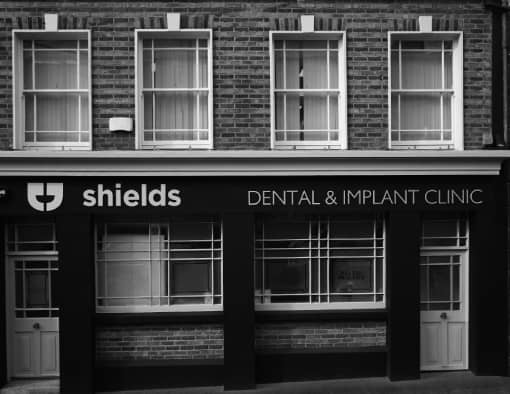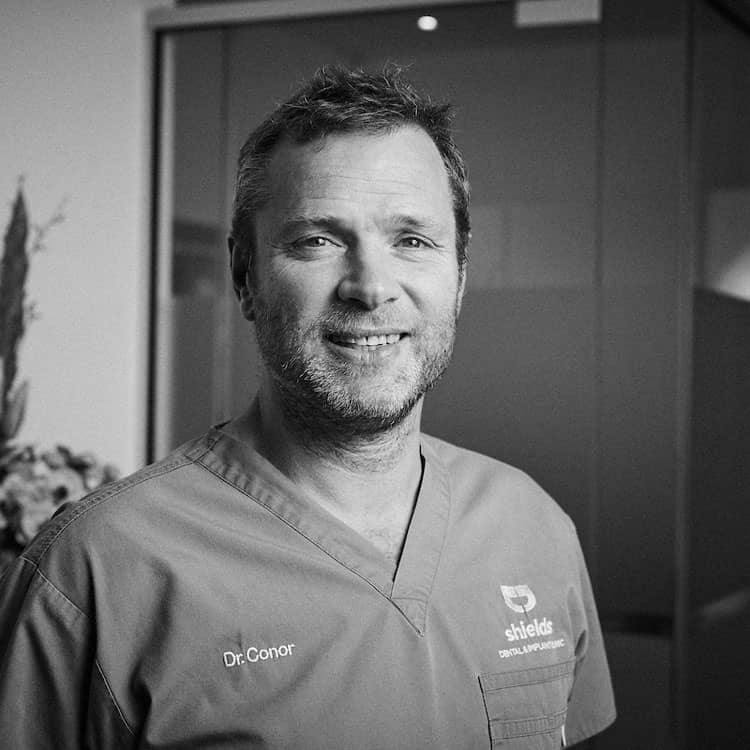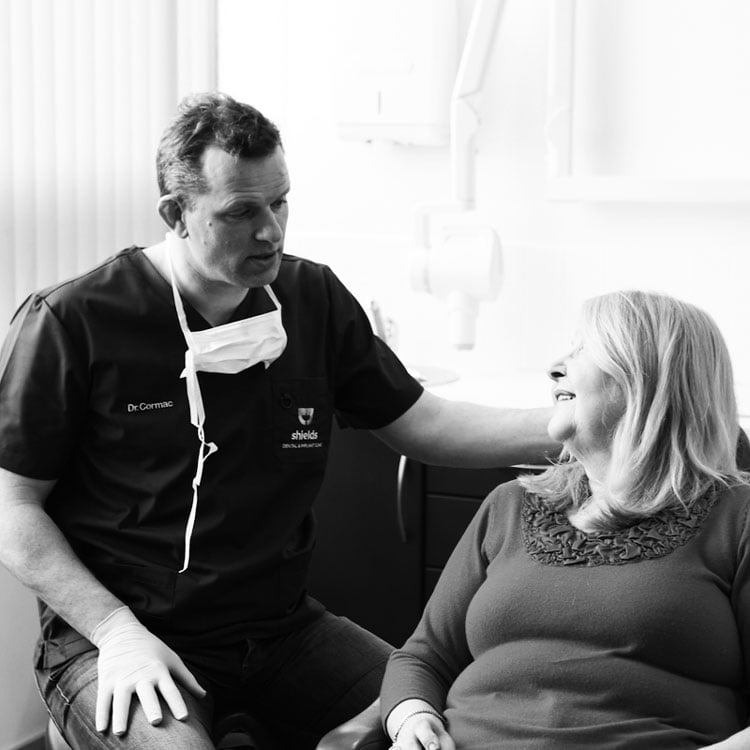A clean mouth with healthy gums
is the foundation of long-term dental health.
The health of your gums is critical in oral health. If they become inflamed and tender, and they bleed while brushing, you may have gum disease.

What is
gum disease?
Gum disease is very common. Indeed, it’s currently recognised as the sixth most common human ailment. Gum disease commonly has two main phases: gingivitis, characterised by mild inflammation and irritation of the gums, and periodontitis — the leading cause of tooth loss.
What many people don’t realise is that as well as being the leading cause of tooth loss, gum disease is also associated with an increased risk of other serious health conditions such as heart disease and strokes. The depth of our team’s knowledge and skills means that your dental hygiene and oral health are in the best possible hands at Shields.
Restore your gums
to full health.
Our hygienists have the expertise to restore your gums to full health and demonstrate how proper cleaning can help keep gum disease at bay.
If you believe you have gum disease, you should contact Shields Dental & Orthodontic Clinic today on061 539322.

FAQs.
Invisible Item
What is gum disease?
There are two main forms: gingivitis and periodontal disease—which describes swelling, soreness or infection of the tissues supporting the teeth.
Gingivitis is inflammation of the gums, which become red and swollen, and often bleed when brushed. Without treatment, gingivitis can turn into periodontal disease, which can lead to loss of the bone anchoring the teeth in the jaw, making them loose. If this is not treated the teeth may fall out.
How likely am I to suffer from gum disease?
Most people suffer from some form of gum disease. It is the major cause of tooth-loss in adults. However, it develops very slowly, and can be slowed down to a rate that will enable you to keep most of your teeth for life.
What causes gum disease?
Gum disease is caused by plaque, a film of bacteria that forms on the surface of the teeth and gums every day. While many of the bacteria in plaque are harmless, some are the main cause of gum disease, so you need to make sure to remove all plaque from your teeth every day, by brushing and flossing.
What happens if gum disease is not treated?
Gum disease progresses painlessly, so you often do not notice the damage it is doing. However, more active bacteria can makes your gums sore, leading to gum abscesses, and, possibly a discharge of pus from around the teeth. Over a number of years, the bone supporting the teeth can be lost, and treatment becomes more difficult if the disease is left untreated for a long time.
How is gum disease treated?
What treatments are needed?
The prescribing dentist will refer you to the practice hygienist for a number of appointments for deep cleaning and oral hygiene instruction. Follow-up appointments are required to monitor and contain disease activity. If you wish to consider tooth-whitening after cleaning is completed, speak to our hygienist who can provide this treatment.
What else may be needed?
Once your teeth are clean, further cleaning may be required at the roots of the teeth to ensure the last pockets of bacteria are removed. This will probably require the treatment areas of treatment to be numbed prior to treatment.
How can I prevent gum disease?
There are various measures that you can take to prevent gum disease as follows:
- Practice good oral hygiene. Make sure you’re using an antibacterial mouthwash and are brushing twice a day, preferably with an electric toothbrush. Ensure that you are using the correct brushing technique and also remember to floss regularly.
- Stay healthy. Healthy people are less unlikely to contract gingivitis, so ensure you have a balanced, nutritious diet to prevent gum disease. Ensure that you get the recommended hours of sleep per night (7-9 hours for adults) as it is also strongly linked with gingivitis prevention.
- Ditch bad habits like smoking and eating sugary or acidic foods as these will weaken your gums. This would include alcohol and fruit juice.
- Stay alert on the signs. If you generally have red, swollen gums or are noticing blood whenever you brush your teeth or floss, you may have gum disease. You must visit your dentist as soon as you notice these symptoms.
Read more on ways to prevent gum disease here.
Once I have had periodontal disease, can I get it again?
Periodontal disease is reversible with the correct professional and home treatment and maintenance. Secondary factors, such as diabetes and smoking, will limit resolution.
Our
treatments.
From the regular check-up to the specialist and advanced treatments that are needed throughout life, we always use state-of-the-art equipment and latest recommended techniques.

Open 7 days*
Highly trained specialists and dentists
Your safety is guaranteed in our hands
Payment options
Technically advanced
Convenient locations
No obligation consultations
Find out what makes us different.
Recent Reviews.

SCR, Limerick, Shields Dental & Orthodontic Clinic

Castletroy, Limerick, Shields Dental & Orthodontic Clinic

Roscrea, Tipperary, Shields Dental & Orthodontic Clinic

Blackrock, Dublin, Shields Dental & Orthodontic Clinic
Convenient
locations.
You don’t have to go to Beverly Hills to look good, you can go local. In convenient locations in Limerick, Castletroy, Roscrea and Blackrock Dublin. Comfortable but advanced, friendly but professional. Click on your preferred location in the menu or use the arrows to discover more.
For the
smile you have
always wanted.
Use our FREE consultation service to speak to one of our Treatment Coordinators, who give you information about how we can help, without any financial commitment.
Most importantly it helps to build your confidence in starting your journey with Shields to the smile you have always wanted.
We’ll discuss with you what you would like to achieve with your dental health and the appearance of your smile, answer any questions and listen to any problems you may have had with your teeth in the past.








